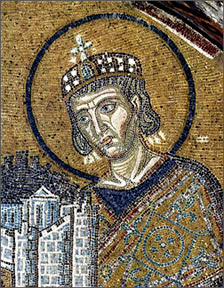Anecdota, the unpublished works
 ‘The
Secret History’ by Procopius of Ceasarea had been originally called
‘Anecdota’ by the Greeks, because it was not published during his
lifetime. The question had been raised, why was the book written if it
could not be published by Procopius who has been called the principal
historian of the 6th century, ‘The
Secret History’ by Procopius of Ceasarea had been originally called
‘Anecdota’ by the Greeks, because it was not published during his
lifetime. The question had been raised, why was the book written if it
could not be published by Procopius who has been called the principal
historian of the 6th century,
How many other books could there have been, since man began writing,
and how many such writings had been lost forever, because they were
never published. Before the advent of printing, publishing meant making
hand written copies, by the author himself or by others. Sometimes only
a single copy would be made and the only manuscript could get lost or
destroyed and such a loss would be forever.
From the time writing developed, some writing would never have come
out into the open, for fear of suppression, harassment, even the life of
the writer. It continues even today, and will continue as long as a few
people are hungry for power, political and religious, as we find that
libraries have often been the first targets for destruction. That is how
mankind lost millions of books, around the world, over the ages.
|

Emperor Constantine I presents a representation of the city
of Constantinople as tribute to an enthroned Mary and Christ
Child in this church mosaic |
In ‘The Cambridge Companion to Aristotle’ Jonathan Barnes has
commented that “we have only about one third of all his works”. Out of
90 plays written by Aeschylus, only 6 plays have survived. A list of
such lost manuscripts are found at http://en.wikipedia.org/wiki/Lost_work#cite_note-1
The only manuscripts that have come down to us for thousands of years
are what were written on stone, or in caves and walls still standing,
like our own ‘Katbitha’ in Sigiriya. Yet what is written on stone could
be destroyed too.
Prof. Senarath Paranavitana based his ‘Story of Sigiri’, on the lost
manuscript by Ananda Sthavira (formerly Buddhamitra of Suvarnapura),
which were in turn based on the Paramparapusthaka and Sihigiri-Vitara,
lost for ever. Ananda-sthavira’s Sanskrit book had been inscribed on
stone during the reign of Parakramabahu VI, but had been made illegible
after the king’s demise.
There is no way for us to know how many other books about our history
would have been lost for ever. Historians like Procopius may have lived
in our country too, and if their writings were available today, we could
have a more accurate account of our history, than what we now know from
our ancient chronicles.
If in India a historian had accompanied Asoka during his inhuman
campaigns to conquer more land, and then during his ‘Dharmavijaya’, then
we would not have to depend only on Asokan Edicts to know about this
period in the history of India.
The poetry of the 12 great poets of ancient Sri Lanka also comes to
mind, as we read about them in ‘Agbo Da Dolos Maha Kaviyo’, the drama
written by Kalasuri U. A. S. Perera and and Kala Keerthi Panditha Wimal
Abhayasundera.
With the arrival of printing technology and the mass production of
books, publication came under the control of the publisher, which became
the main reason for works to end up as unpublished manuscripts. Some
writers would never get an opportunity to have their books published.
Even today manuscripts get lost, sometimes stolen, specially the real
manuscripts written on paper by hand, without any copies. Books written
on a computer too could get lost or destroyed, if there were no backups.
About stolen manuscripts one instance that comes to mind is ‘The
Alien’ by Satyajit Ray, which The Times of India claimed influenced ‘ET’
by Speilberg. Ray wrote ‘The Alien’ in 1967, based on his own short
story ‘Banku Babu’s Friend’, and was to be produced by Columbia. Due to
some mysterious reasons, the film never happened. There were allegations
of an involvement of a Lankan film director.
In 1982 when ‘ET’ was released many people, including Arthur C. Clerk
had seen similarities with ‘The Alien’. “ET would not have been possible
without my script of The Alien being available throughout America in
mimeographed copies.” Ray had said. (quoted in ‘Satyajit Ray : Beyond
the Frame’, by Surabhi Banerjee)
Evelyn Waugh had burnt the manuscript of ‘Temple at Tatch’ (1925),
when his friend Harold Acton had commented adversely about the work.
Dame Barbara Cartland had left 160 unpublished stories. It was
probably because her publishers could not keep up with her writing. She
is claimed to have written 10 books a year at first and from 1977 to
1997 at the rate of 20 books a year.
A major example of unpublished non-fiction is Hitler’s ‘Zweites
Buch’, written in 1928, after his ‘Mein Kampf’, which was first
published in 1961, the authoritative English translation in 2003.
Today manuscripts need not get lost, copies can be made, even of
handwritten creations, by photocopying, or scanning and digitizing the
document. Once digitized, it can be stored in one’s own computer, as
backups in USB flash drives or even in the ‘clouds’, (on-line storage
sites).
Publishing too can be on the internet, and there are enough ways to
avoid censorships and interference by the ‘Big Brother’. No creative
writing need to go unpublished today. The good or the bad to be decided
by the reader, and by time. [email protected]
|



